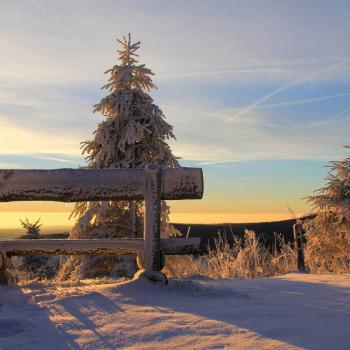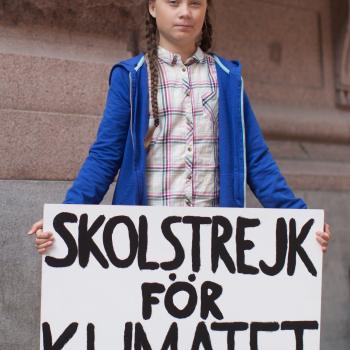The Adventurous Lectionary – Pentecost 12 – September 1, 2019
Jeremiah 2:4-13; Psalm 81:1,10-16; Hebrews 13:1-8, 15-16.; Luke14:1, 7-14
As summer ends, the political season is heating up, and invectives come forth from the White House on what seems like an hourly basis. The nation seems to have no clear direction and no rational domestic or national strategies appear to be in place. The body politic is fragile and in danger of collapse. Church life also takes on a renewed urgency and after a summer’s lull, decisions need to be made and leaders need to come forth. The church is always influenced by its surrounding culture, and though we need to maintain a critical distance from the powers and principalities, we are tempted to succumb to the surrounding incivility and polarization, separating the world in terms of winners and losers, right and wrong, and good and evil. In our magnanimous progressivism, we may demonize and denigrate those whose policies we oppose, even within our own political party and religious perspective. While today’s scriptures are strong in their critique, they also challenge self-righteous and polarizing behaviors and words.
Jeremiah’s words are hard to hear, whether in the time of the prophet or our time in the United States. We have turned from the living waters and dug wells of our own. We have turned from the True God to follow gods who are fabrications of our imagination, grounded in greed and individualism. We call ourselves the “chosen,” whether as leaders or as a nation, even though we lack the gifts and graces of godliness. Jeremiah describes the living waters and these waters are poetic, spiritual, and physically tangible: the living waters point to rivers, lakes, streams, and oceans. On Cape Cod, where I live, water is essential to our way of life. What matters to the ocean is a matter of life and death to the fish of the sea and to the land itself. In our time, we would face Jeremiah’s rebuke, for we have followed the false gods of consumption, anti-intellectualism, political expediency, and are oblivious to – or knowingly prevaricate regarding – our role in climate change, such that in 50 years the ground upon which my church sands may be under water.
It’s easy to pick out the idols of our opponents – and each ideology has their own – but for Jeremiah and the God of the prophets, idolatry begins when we act as if we are God, claiming to be able to do as we please with our property, the earth, and other persons. We usurp God when we assume exceptionalism and chosenness, forgetting our finitude, sin, and imperfection. God is the God of life, and this life is for everyone. Worshipping false gods ends up destroying the non-human world, dividing the nation, harming fellow humans, and leaving the earth in waste.
What false gods are we worshipping in our national life? What false gods are worshipped in your congregation? Where are we tempted to “own” the earth and control the future? The God of the prophets cares about what we do: God feels the pain of the earth and those who suffer injustice. The divine pathos, as Abraham Joshua Heschel asserts, means that human behaviors that cause poverty, pain, and disenfranchisement also cause God pain. Conversely, we can never love God in the abstract, but love God best when we love God’s creatures.
The reading from Hebrews connects our relationship with God with our relationships with one another. “Let mutual love continue. Give hospitality to all persons.” We may be entertaining angels unaware. Could the angels in our time be immigrant children or persons bullied and harmed by white supremacists and racist institutions? Could our angel be a political or theological opponent with whom we pause long enough to listen and find the better angels of both of our natures?
Could we be entertaining angels unaware on social media? For those who use Facebook, just think of the vitriolic language “friends” use when they disagree with our positions. Just think of the rhetoric of politicians who try to bully and intimidate their opponents, with veiled threats of violence. Once again, where is our sense that we might be entertaining angels in our midst? Where is our awareness of the dignity of others, much less our example to children, in terms of our language? Can we respond to the challenges of political dialogue and criticism and still recognize the holiness of those with whom we contend?
Jesus’ words regarding banquet guests are also applicable to our time. They seem anachronistic when leaders puff up their chests, proclaiming their indispensability. In contrast, Jesus calls us to mindfulness and humility. We are part of a larger whole in which others matter just as much as we do, and that includes (in God’s eyes) other nations. Those who are confident in God’s grace can advocate for their positions and affirm their value and place in the church and society without diminishing others. If we trust that our lives are in God’s hands, we don’t need to be “first” or “right” or even “orthodox.” We don’t need to worry about criticism or the diversity in our midst. These are all ego-based behaviors that require someone else to be “second,” “wrong,” or “heretical” for us to affirm our own value. Reinhold Niebuhr’s Nature and Destiny of Man: “on having and not having the truth” seems particularly relevant these days. The reality of sin and self-interest counters any sense of righteousness whether it is ethical, economic, spiritual, or doctrinal.
Even on our best days, we are partial, limited, and likely to be wrong about certain things. Yet, we are also God’s beloved, constantly inspired by God, and so we can affirm our own theological and ethical viewpoints, and advocate for social change, without demonizing our opponents. After all, a stopped clock is right twice a day! And, there may be some modicum of truth in our neighbor’s falsehood.
Today’s readings challenge us to look beyond ourselves and to be open to the holiness of others. They challenge us to see God in all things and all things in God, and to remember that God is God and we aren’t. They call us to humility, especially in those areas where we have the greatest expertise and commitment. A healing community recognizes its finitude and imperfection even as it aspires to make God’s realm come alive “on earth as it is in heaven.”
+++
Bruce Epperly is a Cape Cod pastor, professor, and author of over fifty books including “One World: The Lord’s Prayer from a Process Perspective,” “Ruth and Esther: Women of Agency and Adventure,” “The Mystic in You: Discovering a God-filled World,” and “Become Fire: Guideposts for Interspiritual Pilgrims.”












